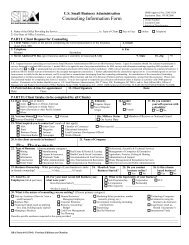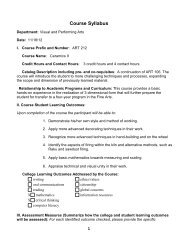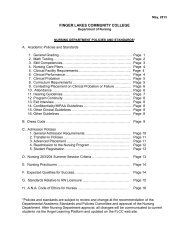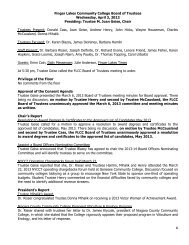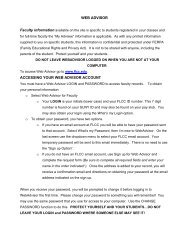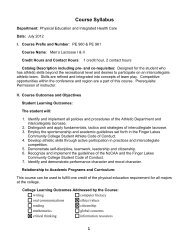View Course Syllabus - Finger Lakes Community College
View Course Syllabus - Finger Lakes Community College
View Course Syllabus - Finger Lakes Community College
Create successful ePaper yourself
Turn your PDF publications into a flip-book with our unique Google optimized e-Paper software.
Department: Visual & Performing Arts<br />
Date: 3/8/12<br />
I. <strong>Course</strong> Prefix and Number: COM 115<br />
<strong>Course</strong> <strong>Syllabus</strong><br />
<strong>Course</strong> Name: Interpersonal Communication<br />
Credit Hours and Contact Hours: 3 credit hours and 3 contact hours<br />
Catalog Description including pre- and co-requisites: The course focuses on the<br />
development of the interpersonal communication skills necessary for building and maintaining<br />
positive relationships in both a personal and professional environment. Topics of study will<br />
include an orientation to interpersonal communication, verbal and non-verbal communication<br />
in career and personal relationships, perception of self and others, listening, managing<br />
conflict, response skills, cultural and gender considerations, characteristics of leadership and<br />
effective work groups, and job interviewing. Students will study various theories and practice<br />
skill development.<br />
II. <strong>Course</strong> Outcomes and Objectives<br />
Student Learning Outcomes:<br />
1. Be able to explain the major concepts of interpersonal communication.<br />
2. Be able to recognize these concepts in their own experiences.<br />
3. Be able to access a range of choices concerning their communication behavior.<br />
4. Be able to integrate the above choices in their personal and professional lives.<br />
5. Possess the knowledge to continue the process of lifelong development of the<br />
communication process.<br />
6. Understand and utilize information technology to communicate interpersonally and to a<br />
group.<br />
Relationship to Academic Programs and Curriculum:<br />
The course meets the oral communication requirement for a number of programs at <strong>Finger</strong><br />
<strong>Lakes</strong> <strong>Community</strong> <strong>College</strong> and at four-year colleges and universities; fulfills a SUNY Gen-Ed<br />
requirement for Basic Communication.<br />
<strong>College</strong> Learning Outcomes Addressed by the <strong>Course</strong>:<br />
writing ethics/values<br />
oral communications citizenship<br />
reading global concerns<br />
mathematics information resources<br />
critical thinking<br />
computer literacy<br />
1
III. Instructional Materials and Methods<br />
Types of <strong>Course</strong> Materials:<br />
Textbook (s)<br />
Methods of Instruction (e.g. Lecture, Lab, Seminar …):<br />
Lectures, group discussions, audio-visual materials, student presentations and role-playing.<br />
IV. Assessment Measures (Summarize how the college and student learning outcomes<br />
will be assessed):<br />
1. Student participation in classroom presentations, role-plays, problem solving situations and<br />
general participation. (oral communications, critical thinking, ethics/values, information<br />
resources, computer literacy)<br />
2. Written examinations and/or quizzes over the contents of the assigned readings to<br />
assess learning outcomes. (reading, critical thinking, ethics/values)<br />
3. Completion of written assignments: (personal journal entries, skill improvement plans,<br />
etc.) to assess learning outcomes. (oral communications, critical thinking, ethics/values,<br />
computer literacy)<br />
V. General Outline of Topics Covered:<br />
A. Understanding Interpersonal Communication<br />
1. Communication Process<br />
2. Social Perceptions<br />
3. Communicating in Relationships<br />
4. Verbal Communication<br />
5. Nonverbal Communication<br />
B. Developing Interpersonal Communication Skills<br />
1. Conversational Skills<br />
2. Listening Effectively<br />
3. Empathic Responsiveness<br />
4. Self-Disclosure and Feedback<br />
5. Interpersonal Influence<br />
6. Managing Conflict<br />
C. Using Interpersonal Communication Skills<br />
1. Communicating in Intimate Relationships<br />
2. Communicating in the Workplace<br />
3. Electronically Mediated Interpersonal Communication<br />
* Gender and cultural considerations are addressed with each relevant<br />
topic.<br />
2



